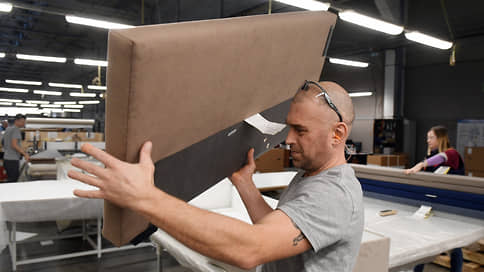Furniture manufacturers want to introduce a collective agreement with marketplaces

Furniture manufacturers intend to obtain from the marketplaces concluding a collective agreement that regulates the conditions of sales of their products on online platforms. Industry companies complain about the lack of compensation in case of damage to goods during delivery to customers, as well as the unilateral nature of the offer, along which the largest sites work. At the same time, a third of furniture sales already account for marketplaces, and by 2026 this figure can grow to 40%.
As Kommersant was told in the Association of Furniture and Woodworking Enterprises of Russia (AMDPR), the participants in the association intend to initiate the creation of a working group to develop a collective agreement between furniture producers and marketplaces. They note that they have already sent their proposals about joint work on the collective agreement Ozon, Yandex Market and Megamarket.
According to the AMDPR, now the share of furniture sales through marketplaces exceeds 30%, which is about 100-150 billion rubles. By 2026, the share of marketplaces can reach 40%, predict in association. At the same time, furniture on online sites is mainly represented in the economy segment-according to analysts, it accounts for over 70% of sales. On marketplaces, products in a low -price segment are mainly sold, confirmed by Mr.Doors interior general Sergey Shikhov. Consumers who are accustomed to order furniture according to individual parameters rarely make purchases on such platforms, he adds.
Despite the fact that marketplaces and offline retailers are now competing on an equal footing, the legal regulation of online sales remains fragmented, the President of the AMDPR and the owner of the first furniture factory Alexander Shestakov states. According to him, working conditions on marketplaces are often set unilaterally, without guarantees and compensations for manufacturers, which creates high risks for them.
The difficulties of working with marketplaces are mainly associated with returns, damage to the goods and the growth of commissions, the head of the Department for working with marketplaces of the furniture factory Lazurit Oksana Smagina agrees. Now online trade brings the company at least 2% of the revenue, it adds.
Without regulation from the market, up to 15% of small manufacturers of furniture can leave, Mr. Shestakov insists. In conditions of reducing demand from consumers for furniture after the cancellation of a mass preferential mortgage that maintains the demand for such products, including from buyers of apartments in new buildings, small enterprises agree to any conditions to maintain the turnover and loading of production, he explains. It is extremely difficult to promote additional regulatory measures on marketplaces, since they have more opportunities to influence regulatory processes, said Andrei Korolev, managing partner of the Law Firm “Practice for Practitioners”.
In Ozon, Yandex Market and Megamarket, as well as the associations of Internet trade companies (akit) did not respond to the Kommersant’s request.
It is important to take into account that an online platform is a large-scale platform with unified rules that provide equal conditions for a wide range of sellers, says Alexander Abramov, director of the market for the Leman pro marketplace. In his opinion, the creation of individual working groups or special conditions for specific commodity categories can significantly complicate operating processes and affect the controllability of the system as a whole.
Marketplais already answers before the seller, in accordance with the norms of federal legislation, in the event of damage or loss through his fault of other people’s property, says Ilya Zharsky, managing partner of the VETA expert group. The weak position of the sellers is more than due to the conditions for the fulfillment of obligations by the marketplaces that they cannot influence, including the procedure and terms for processing and transferring funds for the goods sold, says Denis Yezhov, senior lawyer of the international commercial law “Melling, Login, and Partners”.








